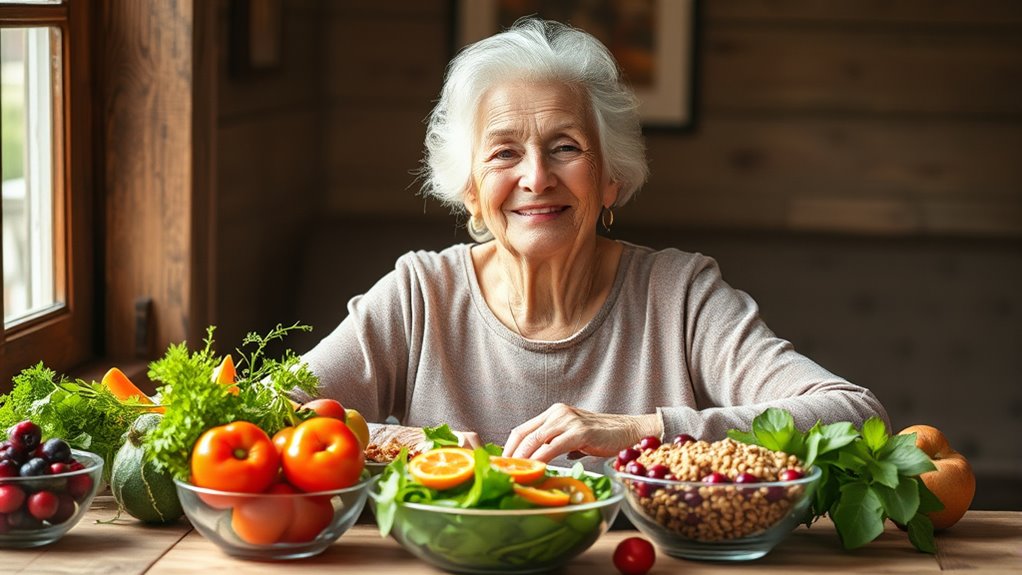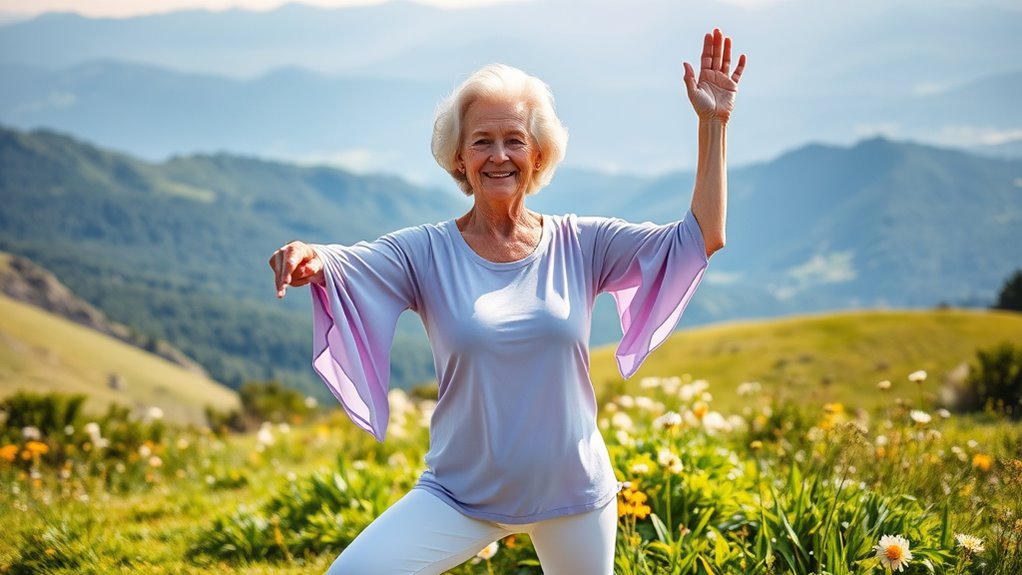To age well as a woman, focus on eating a balanced diet rich in fruits, vegetables, and healthy fats, while staying physically active through regular exercise and strength training. Prioritize routine health checks, manage stress with mindfulness, and nurture strong social ties. Avoid harmful habits like smoking and excessive drinking. Embrace lifelong learning and create a supportive environment to boost resilience. Keep going, and you’ll uncover even more habits that support your vibrant, long life.
Key Takeaways
- Maintain a balanced diet rich in fruits, vegetables, whole grains, and healthy fats, like the Mediterranean diet.
- Engage in regular physical activity, including aerobic exercises and strength training, to preserve muscle and bone health.
- Prioritize routine medical check-ups and screenings to detect and manage health issues early.
- Practice stress management techniques such as mindfulness, meditation, and fostering strong social connections.
- Stay mentally active through lifelong learning, curiosity, and participating in community activities to support cognitive resilience.
Maintaining a Balanced and Healthy Diet

Maintaining a balanced and healthy diet is essential for promoting longevity and overall well-being. When you focus on eating lean proteins, fresh fruits, vegetables, whole grains, and pulses, you support your body’s health and reduce chronic disease risks. Following dietary guidelines, like those in Australia, can boost your chances of living into your late seventies, especially for women. Embracing the Mediterranean diet—rich in olive oil, fish, and plant-based foods—has been linked to lower mortality rates. Consistently choosing these nutritious foods helps prevent heart disease, diabetes, and other chronic conditions. Prioritizing fruits, vegetables, whole grains, healthy fats, and pulses in your daily meals forms a solid foundation for healthier aging and longer life. Incorporating self-watering plant pots into your home gardening routine can encourage a mindful approach to nurturing your environment, which has been linked to improved mental health and well-being. Additionally, adopting healthy eating habits such as meal planning and mindful eating can further enhance your nutritional intake and overall health. Developing nutrient-dense meal plans that focus on variety and balance ensures you get essential vitamins and minerals regularly. Staying committed to these eating habits makes a meaningful difference over time. Incorporating balanced security measures into your overall lifestyle can further enhance your resilience and well-being as you age. Moreover, understanding the importance of continuous learning about nutrition can help you adapt your diet to evolving health needs and scientific insights.
Staying Physically Active Throughout Life

Maintaining a consistent exercise routine is key to reaping long-term health benefits. Incorporating strength training along with other activities helps preserve muscle mass and mobility as you age. By making exercise a regular part of your life, you can boost your chances of living longer and healthier. Embracing a flat iron bike even in everyday activities can also support mental agility and overall well-being. Additionally, engaging in activities like Kia Tuning can promote physical activity that enhances coordination and motor skills. Understanding performance tuning laws can help ensure your fitness routines are safe and effective, minimizing the risk of injury. Staying informed about digital literacy programs can further empower seniors to communicate and stay connected effectively.
Consistent Exercise Routine
Staying physically active throughout your life offers significant longevity benefits, especially for women who often need less exercise to achieve these gains. Research shows women can reduce their risk of death by 18% to 24% through regular activity, sometimes with just 140 minutes of moderate aerobic exercise weekly. Activities like brisk walking or cycling are effective and require less time than men need for similar benefits. Consistency is key—maintaining a routine over the years maximizes these advantages. Engaging in varied aerobic activities not only boosts cardiovascular health but also enhances overall vigor. Even exceeding the recommended 150 minutes of weekly exercise can lead to further reductions in mortality risk. Additionally, incorporating glycolic acid exfoliating toners into skincare routines can improve skin texture and boost confidence, supporting overall well-being. Staying active helps improve brain health, which is vital for maintaining mental clarity and emotional resilience as you age. Regular movement also stimulates mental sharpness, ensuring you stay cognitively agile longer.
Incorporate Strength Training
Incorporating strength training into your routine is essential for lifelong health and longevity. Regular workouts two to three times a week can substantially lower your risk of mortality and improve overall well-being. To make the most of it, consider these key benefits:
- Boosts cardiovascular health, reducing heart-related deaths by 30%
- Preserves muscle mass, helping prevent sarcopenia as you age
- Increases bone density, lowering osteoporosis risk
- Enhances physical function, reducing frailty and fall risk
- Utilizing projector technology in your home cinema setup can create an immersive environment that motivates consistent workout routines. Additionally, incorporating rustic decor elements, such as vintage weights or farmhouse-inspired gym accessories, can boost motivation and make exercise spaces more inviting. Paying attention to wall organization systems can also help keep your workout area tidy and inspiring. Engaging in mindful movement practices like yoga can further support your strength and flexibility goals. Incorporating evidence-based exercise guidelines can ensure your routine is both safe and effective for long-term health benefits.
Prioritizing Regular Medical Check-Ups

Prioritizing regular medical check-ups is essential for detecting health issues early and improving your chances of living a longer, healthier life. Regular visits boost your life expectancy by up to two years and help identify chronic conditions before they worsen. Screenings like mammograms, Pap smears, and blood pressure checks catch problems early, making treatment more effective and reducing complications. Women over 40 should schedule mammograms every one or two years, and annual Pap smears start at age 21. Regular health monitoring also supports timely interventions that manage risks like heart disease and cancer. For women with dense breast tissue or unique health concerns, utilizing ultrasound as a complementary diagnostic tool can enhance detection accuracy. Women who stay proactive with check-ups tend to enjoy better health, fewer chronic issues, and longer lives. Access to consistent healthcare truly makes a difference in maintaining your well-being over time. Understanding the importance of routine health screenings can further empower women to take charge of their long-term health, especially as advancements in remote healthcare platforms expand access to preventive care. Recognizing the causes and contributing factors of health issues can help tailor preventative strategies effectively. Additionally, maintaining awareness of spiritual energy can support emotional resilience and overall well-being, complementing medical efforts.
Managing Stress Effectively

Managing stress effectively is essential for maintaining your overall health and slowing the biological aging process. Chronic stress shortens telomeres, increases inflammation, and lowers protective hormones like klotho, accelerating aging. To manage stress wisely, consider these strategies:
- Maintain moderate stress levels perceived as normal to optimize longevity.
- Address depressive symptoms through therapy or relaxation techniques to prevent further biological aging.
- Monitor your stress responses regularly to identify triggers and adjust accordingly.
- Engage in activities that promote mental well-being, such as meditation, exercise, or hobbies.
- Be aware of how market manipulation tactics like pump and dump schemes can cause sudden stress and financial anxiety, so stay informed and cautious in your investment decisions.
- Additionally, observing how celebrity lifestyles influence stress levels can provide insights into managing personal well-being amidst social pressures.
Building and Sustaining Strong Social Connections

Building and maintaining strong social connections is a crucial component of longevity, as meaningful relationships provide emotional support, promote healthier behaviors, and help buffer against stress. When you have a diverse social network—spouse, close friends, or community involvement—you’re more likely to live longer. Regular interaction not only boosts happiness but also improves immune function and reduces physiological stress. Strong relationships help regulate stress hormones, lowering risks of chronic diseases like cardiovascular conditions and cognitive decline. To strengthen your social ties, invest time in deepening existing relationships and engaging in community activities. Using technology can help you stay connected despite busy schedules or geographic barriers. Prioritizing these connections promotes resilience, healthier habits, and ultimately, a longer, more vibrant life.
Practicing Preventive Healthcare Measures

Practicing preventive healthcare measures is essential for maintaining long-term health and increasing your lifespan. Regular health visits can add up to two years to your life, especially when you see healthcare professionals annually. To maximize this benefit, focus on these key actions:
- Schedule regular checkups and screenings to catch health issues early.
- Engage in age-appropriate screenings like mammograms and colon cancer tests.
- Stay up-to-date on vaccinations, including flu and pneumococcal shots.
- Seek lifestyle and exercise counseling to manage chronic conditions effectively.
Cultivating Positive Mental Health Habits

You can boost your mental health by practicing mindfulness techniques, which help diminish stress and improve focus. Maintaining strong social ties provides emotional support and contributes to long-term resilience. Prioritizing self-care rituals ensures you stay connected with yourself and manage daily challenges effectively.
Practice Mindfulness Techniques
Mindfulness techniques offer an effective way to cultivate positive mental health habits that support healthy aging. When you practice mindfulness, you enhance self-awareness and improve your stress response. This not only reduces anxiety but also fosters emotional balance. Here are four ways mindfulness benefits you:
- Focuses attention on the present, decreasing cognitive stress.
- Cultivates a non-judgmental attitude toward your thoughts, lowering mental clutter.
- Increases positive emotions, boosting overall well-being.
- Supports emotional regulation, helping you manage life’s challenges better.
Regular mindfulness practice, like mindful breathing or observation, promotes mental clarity and resilience. It’s a powerful tool for slowing cellular aging and maintaining mental energy as you age gracefully.
Maintain Strong Social Ties
Building strong social ties can markedly enhance your mental health as you age, complementing the benefits gained from mindfulness practices. Maintaining a diverse network—spouse, friends, relatives, and community connections—provides essential emotional, informational, and practical support. Women with rich social integration tend to live longer, reaching age 85 or beyond, with a 50% increase in longevity linked to strong relationships. Conversely, loneliness and social isolation substantially raise the risk of premature death, comparable to other major health threats like smoking or obesity. Engaging regularly with loved ones and participating in various activities boosts emotional well-being, reduces stress, and fosters better physical health. Strengthening these bonds creates a resilient support system, helping you navigate life’s challenges and enjoy a healthier, longer life.
Prioritize Self-Care Rituals
Prioritizing self-care rituals plays a crucial role in maintaining mental and emotional health as you age. When you make time for self-care, you support your well-being and foster a positive mindset. Here are four ways to cultivate these habits:
- Practice mindful eating by choosing nutrient-rich foods like fruits, vegetables, and lean proteins to boost energy.
- Incorporate regular movement, such as walking or stretching, to preserve physical and mental health.
- Prioritize quality sleep to help your body recover and strengthen resilience.
- Engage in lifelong learning to stimulate your brain, improve memory, and promote personal growth.
Avoiding Harmful Substances and Behaviors

Avoiding harmful substances and behaviors is essential for extending your healthy lifespan. Staying away from cigarettes substantially lowers your risk of cardiovascular disease, cancer, and chronic obstructive pulmonary disease (COPD). Women’s longer life expectancy partly results from historically lower smoking rates. Limiting alcohol intake also boosts longevity by reducing liver disease, cancers, and accidents, while moderating mental health issues like anxiety and depression. Avoiding illicit drugs and careful management of medications prevent overdose, organ damage, and disability. Minimizing exposure to environmental toxins such as air pollution and chemicals helps protect your respiratory and cardiovascular health. Finally, steering clear of risky behaviors like dangerous driving and unsafe activities reduces injuries and chronic disabilities. Making these choices supports better health and longevity, helping you age with vigor and resilience.
Embracing Lifelong Learning and Personal Growth

You can boost your longevity by committing to continuous skill development and staying curious every day. Expanding your knowledge horizons keeps your mind sharp and fosters personal growth. Embracing lifelong learning empowers you to adapt, thrive, and enjoy a more fulfilling, healthier life.
Continuous Skill Development
Engaging in continuous skill development throughout your life can substantially boost your health and longevity. Learning new skills keeps your brain active, delays biological aging, and reduces the risk of cognitive decline. It also enhances emotional resilience by providing a sense of purpose and achievement. Here are four benefits:
- Supports brain plasticity, lowering dementia risk.
- Promotes emotional well-being through personal growth.
- Delays age-related diseases by maintaining mental sharpness.
- Fosters social engagement and strengthens connections.
Cultivating Curiosity Daily
Building on the idea that continuous skill development benefits your brain and emotional resilience, cultivating curiosity daily adds another powerful layer to healthy aging. When you embrace curiosity, you protect your brain from decline and reduce Alzheimer’s risk. This ongoing engagement keeps your mind sharp and boosts emotional well-being, giving you a sense of purpose and fulfillment. Whether exploring new hobbies or asking questions, this habit nurtures social connections and adaptability. Here’s how curiosity manifests:
| Type of Curiosity | Benefit |
|---|---|
| Trait Curiosity | Maintains overall mental engagement |
| State Curiosity | Sparks immediate interest and discovery |
| Interest-based Curiosity | Aligns learning with personal passions |
| Surge in Curiosity | Continues to grow into later years |
Expanding Knowledge Horizons
Lifelong learning is a vital component of healthy aging, as it continually stimulates the mind and fosters personal growth. When you embrace ongoing education, you can enjoy numerous benefits. For example:
- You reduce your risk of early death by staying mentally active through learning.
- You enhance your social life by engaging in educational activities and community programs.
- You improve your health literacy, making better decisions about healthcare and wellness.
- You support cognitive health, lowering the chances of cognitive decline over time.
Continuing to learn at any age not only boosts your longevity but also enriches your life with new skills and connections. By expanding your knowledge horizons, you nurture both your mind and your well-being, helping you age gracefully and vibrantly.
Creating a Supportive and Healthy Environment

Creating a supportive and healthy environment is essential for promoting longevity, as your surroundings directly influence your physical and mental well-being. Environmental factors, like housing conditions and exposure to pollution, can accelerate aging and increase disease risk. Socioeconomic status also plays a pivotal role; higher income and stable employment provide access to better healthcare, nutrition, and safer living spaces. Reducing stressors in your environment helps slow biological aging and supports mental health. Strong social networks and community ties boost emotional resilience, lower loneliness, and promote healthier aging. Engaging in community activities fosters a sense of purpose. By creating a safe, low-stress, and socially connected environment, you set the foundation for a longer, healthier life.
Frequently Asked Questions
How Does Genetics Influence Women’s Longevity?
You might wonder how genetics influence women’s longevity. Your genetic makeup, especially having two X chromosomes, provides a backup that can help delay aging and reduce health risks. Certain genes linked to longer life are stronger in women, offering a significant advantage. While your genes play a big role, your environment and lifestyle also matter, so healthy choices can maximize your genetic potential for a longer, healthier life.
What Role Do Hormonal Differences Play in Aging?
Hormonal differences crucially influence how you age. As estrogen declines during menopause, you may see effects on your brain, bones, and metabolism, increasing risks like osteoporosis and cognitive decline. Lower androgen levels can affect muscle mass and overall vitality. Managing these changes through healthy lifestyle choices or therapies like HRT can help you maintain better health, resilience, and a more vibrant aging process.
How Important Is Socioeconomic Status for Women’s Health?
When it comes to your health, socioeconomic status is a game-changer. It influences your access to healthcare, education, and healthy living conditions. If you’re in a lower SES bracket, you might face systemic barriers and health disparities that shorten your lifespan. On the flip side, higher SES often means better health outcomes. So, you see, your social standing really can make or break your health journey.
Can Cultural Norms Impact Women’s Lifespan?
Cultural norms definitely impact your lifespan. They shape access to healthcare, influence your lifestyle choices, and determine social support. When cultural practices limit resources or create health stigmas, your health can suffer. Conversely, cultures that promote gender equality, education, and healthy behaviors help you live longer. Being aware of these norms allows you to make informed choices and seek supportive environments that can improve your longevity.
How Does Mental Health Affect Longevity in Women?
You might think mental health only affects your mood, but it actually plays a big role in your lifespan. Chronic anxiety or depression can increase stress and harm physical health, cutting years off your life. Ironically, even with lower coping resources, cultivating optimism and strong social ties can boost longevity. So, taking care of your mental health isn’t just about feeling good—it’s about adding quality and years to your life.
Conclusion
By adopting these habits, you’re setting yourself up for a longer, healthier life. Staying active, eating well, and managing stress aren’t just tips—they’re the keys to aging gracefully. Some say that a positive mindset and strong social bonds boost longevity more than any medicine. So, embrace lifelong learning and surround yourself with support. Ultimately, aging well is about creating a balanced life where your habits nurture both body and mind.









